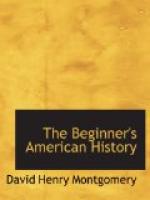10. What happened after they had been at sea many days.—For more than thirty days the three ships kept on their way toward the west. To the crew every day seemed a year. From sunrise to sunset nothing was to be seen but water and sky. At last the men began to think that they were sailing on an ocean which had no end. They whispered among themselves that Columbus had gone mad, and that if they kept on with him in command they should all be lost.
Twice, indeed, there was a joyful cry of Land! Land! but when they got nearer they saw that what they had thought was land was nothing but banks of clouds. Then some of the sailors said, Let us go to the admiral and tell him that we must turn back. What if he will not listen to us? asked others; Then we will throw him overboard and say when we reach Palos that he fell into the sea and was drowned.
But when the crew went to Columbus and told him that they would go no further, he sternly ordered them to their work, declaring that whatever might happen, he would not now give up the voyage.
11. Signs of land.—The very next day such certain signs of land were seen that the most faint-hearted took courage. The men had already noticed great flocks of land-birds flying toward the west, as if to guide them. Now some of the men on one vessel saw a branch of a thorn-bush float by. It was plain that it had not long been broken off from the bush, and it was full of red berries.
But one of the crew on the other vessel found something better even than the thorn-branch; for he drew out of the water a carved walking-stick. Every one saw that such a stick must have been cut and carved by human hands. These two signs could not be doubted. The men now felt sure that they were approaching the shore, and what was more, that there were people living in that strange country.
12. Discovery of land.—That evening Columbus begged his crew to keep a sharp lookout, and he promised a velvet coat to the one who should first see land. All was now excitement; and no man closed his eyes in sleep that night.
Columbus himself stood on a high part of his ship, looking steadily toward the west. About ten o’clock he saw a moving light; it seemed like a torch carried in a man’s hand. He called to a companion and asked him if he could see anything of the kind; yes, he, too, plainly saw the moving light, but presently it disappeared.
Two hours after midnight a cannon was fired from the foremost vessel. It was the glad signal that the long-looked-for land was actually in sight. There it lay directly ahead, about six miles away.
[Illustration: Map showing the direction in which Columbus sailed on his great voyage across the ocean.]
Then Columbus gave the order to furl sails, and the three vessels came to a stop and waited for the dawn. When the sun rose on Friday, October 12th, 1492, Columbus saw a beautiful island with many trees growing on it. That was his first sight of the New World.




